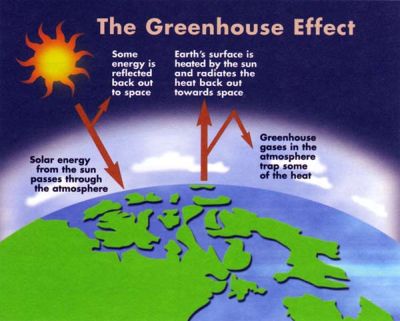What is it?
Met Office describes climate change as a large-scale, long-term shift in the planet's weather patterns or average temperatures. Earth has had tropical climates and ice ages many times in its 4.5 billion years. Nowadays, Since the last ice age, which ended about 11,000 years ago, Earth's climate has been relatively stable at about 14 °C. However, in recent years, the average temperature has been increasing. And from the WWF website, they note that as the planet heats, climate patterns change, with more extreme and unpredictable weather across the world – many places will be hotter, some colder. Some wetter, others drier. The planet so far has warmed by an average of nearly 1ºC in the past century. For the poor UK, this means a hell of a lot of flooding.
What causes global warming?
The thing about global warming is that it is mainly due to a very problematic gas that there is too much of: carbon dioxide (CO2) in the atmosphere. Carbon dioxide acts as a blanket, trapping heat and warming the planet. As we burn fossil fuels like coal, oil and natural gas for energy or cut down and burn forests to create pastures and plantations, carbon accumulates and overloads our atmosphere. Certain waste management and agricultural practices aggravate the problem by releasing other potent global warming gases, such as methane and nitrous oxide. CO2 survives in the atmosphere for a long time—up to many centuries—so its heat-trapping effects are compounded over time. Of the many heat-trapping gases, CO2 puts us at the greatest risk of irreversible changes if it continues to accumulate unabated in the atmosphere which it is likely to do if the global economy remains dependent on fossil fuels for its energy needs. Additionally, there is more than one greenhouse gas. Different greenhouse gases have very different heat-trapping abilities. Some of them can even trap more heat than CO2. A molecule of methane produces more than 20 times the warming of a molecule of CO2. Nitrous oxide is 300 times more powerful than CO2. Other gases, such as chlorofluorocarbons (which have been banned in much of the world because they also degrade the ozone layer), have heat-trapping potential thousands of times greater than CO2. But because their concentrations are much lower than CO2, none of these gases adds as much warmth to the atmosphere as CO2 does.
Let's bring out the diagrams and pictures:


The best way to understand global warming is through the process of the greenhouse effect. Now this is natural process. It refers to circumstances where shorter wavelengths of visible light from the sun passes through a transparent medium and are absorbed, but the longer wavelengths of the infrared re-radiation from the heated objects are unable to pass through that medium. This trapping of the long wavelength radiation leads to more heating and as a result, a higher temperature. So the Earth gets energy from the sun in the form of sunlight. The Earth's surface absorbs some of this energy and heats up and it cools down by giving off a different form of energy, called infrared radiation. But before all this radiation can escape to outer space, greenhouse gases in the atmosphere absorb some of it, which makes the atmosphere warmer. As the atmosphere gets warmer, it makes the Earth's surface warmer, too.
Here is the diagram of this process:

Consequences of climate change:
Climate change can have devastating consequences. Already, around the globe, life is being transformed; seasons are shifting, temperatures are climbing and sea levels are rising. We already know about the polar ice caps melting, which may eventually lead to the loss of wildlife such as polar bears. Other consequences are: higher temperatures in countries, changing landscapes, rising sea levels, increased risk of drought, fire and floods, storms and storm damage as a result, loss of species and species travelling to other places in the world that can be of consequence to the population e.g. the mosquito travelling to Britain and plaguing us with malaria - it can happen!
Cheerful thoughts. Anywho, so that's our future. Some argue that it's not but there are significant facts out there now that is prevailing over thoughts against believing in climate change. Hope this has been informative and as always, thanks for reading
No comments:
Post a Comment